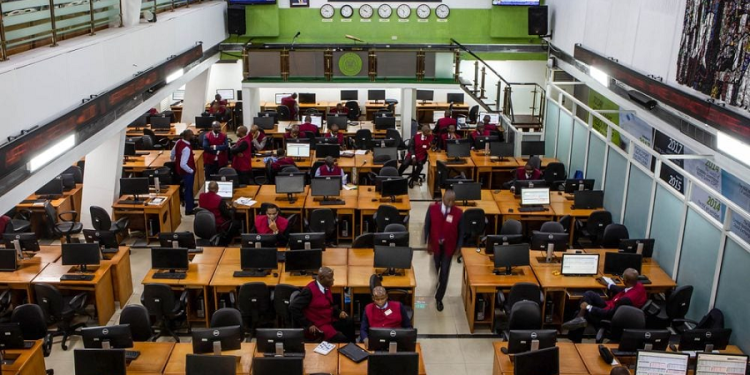Article summary
- The recent interest rate hikes by the Federal Reserve Bank of the United States and the Bank of England may have implications for the Nigeria Exchange, signaling the potential end of the current tightening cycle.
- Higher interest rates in developed countries may attract portfolio investors who seek security and stability, potentially leading to a relocation of assets from Nigeria.
- Despite the challenges of an unstable investment environment, experts believe that with the right policy changes and a smooth presidential inauguration, Nigeria has the potential to become an attractive investment destination and regain foreign investments.
The recent interest rate hikes by the Federal Reserve Bank of the United States of America and the Bank of England may have implications for the Nigeria Exchange.
The Board of Governors of the Federal Reserve System recently voted unanimously to raise the interest rate paid on reserve balances to 5.15%, effective May 4, 2023. This marks the 10th interest rate increase in just a little over a year and hints that the current tightening cycle may be coming to an end.
In a widely expected decision by the markets, the central bank’s Federal Open Market Committee raised its benchmark borrowing rate by 0.25 percentage points. This rate determines the interest banks charge each other for overnight lending and has an impact on consumer debt products like mortgages, auto loans, and credit cards.
Likewise, due to concerns about inflation, the Bank of England has recently raised interest rates for a record-breaking 12th consecutive time. The cost of borrowing has been lifted to 4.5%, and the bank warns that inflation will be higher this year compared to previous expectations.
The US inflation rate currently stands at 4.93%, down from 4.98% last month and 8.26% last year. Despite being higher than the long-term average of 3.28%, there are indications that the rate hikes are having an impact on reining in inflation.
The Bank now forecasts that inflation will reach around 5% by the end of this year, surpassing the previously forecasted 4% level.
Rate hikes in developed countries may attract portfolio investors to invest in their stock exchanges, especially considering the fact that investors have assurances of security and stability. This may induce some investors to transfer their assets to markets they perceive as stable and secure.
Another incentive for moving assets to more developed markets is the potential for higher investment returns. In Nigeria, with a primary interest rate of 18% and an inflation rate of 22%, there is a 4% negative return on investment for a one-year investment. However, portfolio investments are typically not held for a year, as money is often moved around.
What this means for Nigeria
Reacting to this development, Boniface Okezie, the National Chairman of the Progressive Shareholders Association of Nigeria, expressed concerns that some portfolio investments might be withdrawn from the Nigeria Exchange due to the country’s failure to create a business environment that attracts investors. Consequently, investors are likely to redirect their funds to stable economies where they can expect better investment margins.
Nigeria attracted $5.3 billion in capital importation in the whole of 2022 compared to $6.7 billion a year earlier. Capital importation was over $23.7 billion in 2019. Interesting rates for buying Nigerian sovereign securities was as high as 19% at the time.
Moses Igbrude, the President of the Independent Shareholders Association of Nigeria, holds a different opinion. He states that investors generally prefer to put their money in safer and more stable markets. However, he acknowledges that developed markets are heavily regulated, making it difficult for investors to achieve substantial returns on their investments.
This, he believes, provides an incentive to invest in developing markets like Nigeria, which may carry higher risks but also offer significant returns on investment. Igbrude sees the Nigeria Exchange as such a market, highlighting the abundant opportunities and freedom available to investors compared to developed economies.
Igbrude acknowledges that Nigeria may have been perceived as a risky environment for investment in recent months. However, with the conclusion of the elections and the anticipation of returning to normalcy, he believes Nigeria will once again attract investors and become an attractive investment destination. He emphasizes that a stable environment is crucial for Nigeria’s growth and predicts that it will soon be achieved.
Professor Tayo Bello, the Dean at the Faculty of Law, Adeleke University, and a Fellow of the Chartered Institute of Bankers of Nigeria, Certified Institute of Stock Brokers, and Chartered Institute of Administrators, support investing in Nigeria as he sees the potential for better returns compared to investments in the UK.
He points out that the main challenge lies in investor confidence in the Nigerian government. If investors perceive instability, they are likely to withdraw their investments.
Professor Tayo Bello expressed confidence that if the 2023 presidential inauguration proceeds smoothly, Nigeria will become an attractive investment destination. He highlighted Nigeria’s vast potential but pointed out that the country faces challenges such as insincerity, lack of trust, and lack of direction.
Dr. David Jakpor, an economist and economic affairs analyst, also spoke with Nairametrics and emphasized that despite Nigeria’s reputation as an unstable investment destination, which is common for many developing countries, Nigeria still remains a choice for investors.
He acknowledged that foreign investments in Nigeria have declined over the past eight years. However, he believes that with the implementation of the right policy changes by the incoming administration, Nigeria will be put on the right track, leading to a resurgence in foreign investments.



